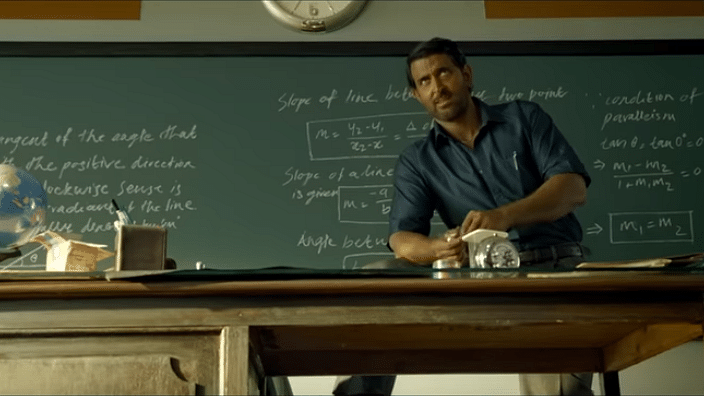For a large number of Indians, the pursuit of a career in engineering is of paramount importance. Not only does this make it one of the most competitive fields to thrive in, but it also raises the bar of the subject matter exponentially — so much so, that many people across the world agree that Indians set the toughest entrance exams (be it UPSC or JEE). So, when Vikas Bahl’s film Super 30 tries and depicts that complexity by showing Hrithik Roshan calculate angles, speed and force, with simple differential equations on the board, it’s not only a shoddy job, it’s downright disrespectful to engineers.
Based on the true story of educationist Anand Kumar and his class of Super 30, the film follows a fictionalised version of his life. Born into a poor family in Bihar, Kumar (played by Hrithik Roshan) is a naturally gifted mathematician, who perseveres and wins every math competition and exam he sits for. He gets into Cambridge University but is unable to go as he is refused a loan by the government and everyone else. Upon the untimely death of his father, he resorts to selling papad to support his brother and mother.
After a chance meeting with a government official, he is made the star teacher of an IIT coaching centre, but he soon makes up his mind not to be a part of the very system that refused him opportunities. He wants to bring change and so, his Super 30 journey begins.
The film is a prime example of irony dying a cruel death. It’s trademark dialogue, “Ab raja ka beta raja nahi banega. Ab raja woh banega jo haqdaar hoga” is spouted constantly by a man who made his career on the shoulders of his father. The film, directed by a man accused of sexual harassment, has a scene where a woman falsely accuses the protagonist of assault and is instantly called out. It’s almost intentional at this point, and in extremely poor taste.
Not to mention the crazy bronzer on Roshan’s face (the Indian version of racism and blackface) to signify his character’s poor beginnings, or his terrible Bihari accent.
Bahl takes all the possible tropes of an underdog story and puts them together and calls it a film. At every turn, you already know what’s going to happen — Kumar’s father is going to die on a rainy night, as the chain of his cycle breaks. The goon-like politicians will play the most predictable dirty tricks in the book. Kumar will inspire the children by pushing them to do something they believe they couldn’t. There is even a Home Alone-inspired scene where the students take on the goons using maths.
To add insult to injury, the film introduces actress Mrunal Thakur as Ritu, Kumar’s love interest, who adds as much to the film as broken education system does to the development of the country. It’s almost as if Bollywood would crumble if a stand-alone story of a person is made without a token love interest.
As for Hrithik Roshan, he tries, but is unable to shake off the superhero image and find his distinct acting style. He is Krrish trying to be an educationist.
There is not much to say about the mediocre cinematography, music, and editing. This is a film for those who believe films aren’t meant to be taken seriously and enjoyed by ‘leaving your brain at home’ because clearly that’s what the filmmakers did.
Also read: Better data can improve public education in India – draft National Education Policy says it too
